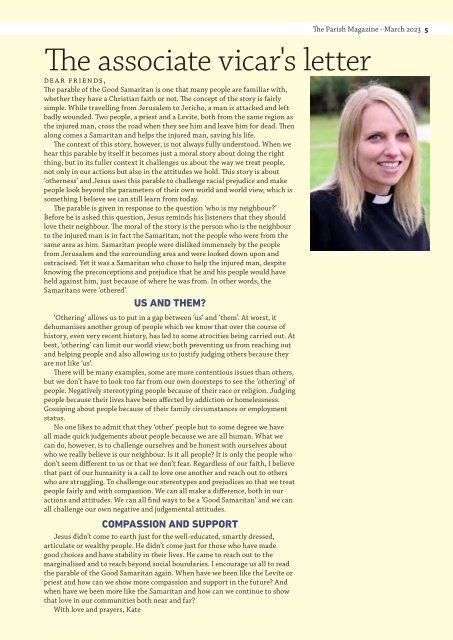The Parish Magazine March 2023
Serving the communities of Charvil, Sonning and Sonning Eye since 1869
Serving the communities of Charvil, Sonning and Sonning Eye since 1869
You also want an ePaper? Increase the reach of your titles
YUMPU automatically turns print PDFs into web optimized ePapers that Google loves.
<strong>The</strong> <strong>Parish</strong> <strong>Magazine</strong> - <strong>March</strong> <strong>2023</strong> 5<br />
<strong>The</strong> associate vicar's letter<br />
Dear Friends,<br />
<strong>The</strong> parable of the Good Samaritan is one that many people are familiar with,<br />
whether they have a Christian faith or not. <strong>The</strong> concept of the story is fairly<br />
simple. While travelling from Jerusalem to Jericho, a man is attacked and left<br />
badly wounded. Two people, a priest and a Levite, both from the same region as<br />
the injured man, cross the road when they see him and leave him for dead. <strong>The</strong>n<br />
along comes a Samaritan and helps the injured man, saving his life.<br />
<strong>The</strong> context of this story, however, is not always fully understood. When we<br />
hear this parable by itself it becomes just a moral story about doing the right<br />
thing, but in its fuller context it challenges us about the way we treat people,<br />
not only in our actions but also in the attitudes we hold. This story is about<br />
‘otherness’ and Jesus uses this parable to challenge racial prejudice and make<br />
people look beyond the parameters of their own world and world view, which is<br />
something I believe we can still learn from today.<br />
<strong>The</strong> parable is given in response to the question ‘who is my neighbour?’<br />
Before he is asked this question, Jesus reminds his listeners that they should<br />
love their neighbour. <strong>The</strong> moral of the story is the person who is the neighbour<br />
to the injured man is in fact the Samaritan, not the people who were from the<br />
same area as him. Samaritan people were disliked immensely by the people<br />
from Jerusalem and the surrounding area and were looked down upon and<br />
ostracised. Yet it was a Samaritan who chose to help the injured man, despite<br />
knowing the preconceptions and prejudice that he and his people would have<br />
held against him, just because of where he was from. In other words, the<br />
Samaritans were ‘othered’.<br />
US AND THEM?<br />
‘Othering’ allows us to put in a gap between ‘us’ and ‘them’. At worst, it<br />
dehumanises another group of people which we know that over the course of<br />
history, even very recent history, has led to some atrocities being carried out. At<br />
best, ‘othering’ can limit our world view; both preventing us from reaching out<br />
and helping people and also allowing us to justify judging others because they<br />
are not like ‘us’.<br />
<strong>The</strong>re will be many examples, some are more contentious issues than others,<br />
but we don’t have to look too far from our own doorsteps to see the ‘othering’ of<br />
people. Negatively stereotyping people because of their race or religion. Judging<br />
people because their lives have been affected by addiction or homelessness.<br />
Gossiping about people because of their family circumstances or employment<br />
status.<br />
No one likes to admit that they ‘other’ people but to some degree we have<br />
all made quick judgements about people because we are all human. What we<br />
can do, however, is to challenge ourselves and be honest with ourselves about<br />
who we really believe is our neighbour. Is it all people? It is only the people who<br />
don’t seem different to us or that we don’t fear. Regardless of our faith, I believe<br />
that part of our humanity is a call to love one another and reach out to others<br />
who are struggling. To challenge our stereotypes and prejudices so that we treat<br />
people fairly and with compassion. We can all make a difference, both in our<br />
actions and attitudes. We can all find ways to be a ‘Good Samaritan’ and we can<br />
all challenge our own negative and judgemental attitudes.<br />
COMPASSION AND SUPPORT<br />
Jesus didn’t come to earth just for the well-educated, smartly dressed,<br />
articulate or wealthy people. He didn’t come just for those who have made<br />
good choices and have stability in their lives. He came to reach out to the<br />
marginalised and to reach beyond social boundaries. I encourage us all to read<br />
the parable of the Good Samaritan again. When have we been like the Levite or<br />
priest and how can we show more compassion and support in the future? And<br />
when have we been more like the Samaritan and how can we continue to show<br />
that love in our communities both near and far?<br />
With love and prayers, Kate

















